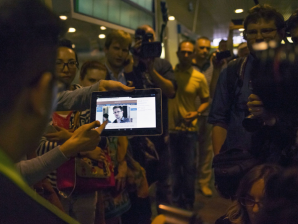Fugitive Snowden in Moscow, seeks Ecuador asylum

Journalists show passengers arriving from Hong Kong a tablet with a photo of Edward Snowden, a former CIA employee who leaked top-secret documents about sweeping U.S. surveillance programs, at Sheremetyevo airport, just outside Moscow, Russia, Sunday, June 23, 2013. AP/Alexander Zemlianichenko
MOSCOW – Fugitive US ex-intelligence worker Edward Snowden on Sunday arrived in Russia on his way to Ecuador, seeking to win asylum in the leftist Latin American state and evade arrest after leaking sensational details of cyber-espionage by Washington.
Snowden, the target of a US arrest warrant issued Friday after the computer expert lifted the lid on massive secret surveillance programmes, arrived in Moscow on a direct flight from Hong Kong and was expected to head to Ecuador via Cuba.
The US State Department reacted angrily to the decision by the Hong Kong government to allow the former National Security Agency (NSA) contractor to travel, saying he should “not be allowed to proceed further”.
Snowden, 30, landed at Moscow’s Sheremetyevo airport on a scheduled Aeroflot flight at 5:05 pm (1305 GMT), an AFP correspondent at the airport said.
He did not emerge into the main terminal area where crowds of journalists quizzed his jet-lagged and bewildered fellow passengers if they had seen the fugitive Snowden on the flight.
Airport officials said Snowden in fact never crossed the border and would spend the night in the Vozdushny Express “capsule hotel” inside the departures area ahead of his next flight.
Russian media reports cited sources within Aeroflot as saying he would fly onwards to Cuba on Monday. The SU 150 flight to Havana leaves at 1005 GMT.
— ‘Bound for Ecuador via a safe route’ —
Reports initially said the man behind one of the most significant security breaches in US history would then fly to the Venezuelan capital Caracas, but Ecuador Foreign Minister Ricardo Patino said he had asked Quito for asylum.
“The government of Ecuador has received an asylum request from Edward J. Snowden,” Patino said on Twitter.
Ecuador, led by outspoken leftist President Rafael Correa, has been sheltering WikiLeaks founder Julian Assange, who is wanted by Sweden, at its London embassy for the past year.
The WikiLeaks website said it had helped organise Snowden’s safe exit and confirmed Snowden “is bound for the Republic of Ecuador via a safe route for the purposes of asylum”.
A US source familiar with the case said in Washington Sunday that the United States had revoked Snowden’s passport. But Russian officials indicated that this caused no problem.
“If he has asked for asylum in Ecuador then they could give him a refugee document or even Ecuadorian citizenship allowing him to continue his journey,” a security source told Interfax.
A source at Sheremetyevo told Interfax that “transit passenger” Snowden was still at the airport. “He would not be able to leave the airport even in a diplomatic car— he has neither a standard nor a diplomatic visa,” the official said.
AFP correspondents earlier saw a diplomatic car at VIP arrivals with the flag of Ecuador. The Ecuadorean ambassador to Moscow was reportedly at the airport to meet Snowden.
Former Spanish judge Baltasar Garzon, legal director of WikiLeaks, condemned the pursuit of both Assange and Snowden as an “assault against the people”.
WikiLeaks confirmed that Snowden was accompanied by a British citizen named Sarah Harrison, whom it described as a “journalist, and legal researcher” working with the WikiLeaks legal team.
— ‘No legal basis to stop him leaving’ —
Snowden’s latest interview on Sunday contained new revelations about US cyber-espionage against Chinese targets, drawing a stinging response from China’s official news agency Xinhua which branded Washington an espionage “villain”.
In the latest revelations in the South China Morning Post, Snowden said the NSA was hacking Chinese mobile phone companies to gather data from millions of text messages.
He said US spies have also hacked the prestigious Tsinghua University in Beijing— home to one of six “network backbones” that route all of mainland China’s Internet traffic— and the Hong
Kong headquarters of Pacnet, which operates one of the Asia-Pacific region’s largest fibre-optic networks.
Snowden abandoned his high-paying job in Hawaii and went to Hong Kong on May 20 to begin issuing a series of leaks on NSA eavesdropping of phones and computer systems, triggering concern from governments around the world.
US President Barack Obama’s administration, which on Friday unveiled charges including theft and espionage against Snowden, has insisted on the legality of the vast surveillance programme and said it has foiled a number of extremist plots.
White House National Security Advisor Tom Donilon had said on Saturday that the charges presented a “good case” for Hong Kong to extradite him and that “we expect them to comply with the treaty in this case”.
But the government of Hong Kong, a special administrative region (SAR) under Chinese rule that has maintained its own British-derived legal system, said it had informed Washington of Snowden’s exit after determining that the documents provided by the US government did not fully comply with Hong Kong legal requirements.
“As the HKSAR government has yet to have sufficient information to process the request for provisional warrant of arrest, there is no legal basis to restrict Mr Snowden from leaving Hong Kong,” it said in a statement.
The charges against him include theft of government property, unauthorised communication of national defence information, and wilful communication of classified communications intelligence information to an unauthorized person.














